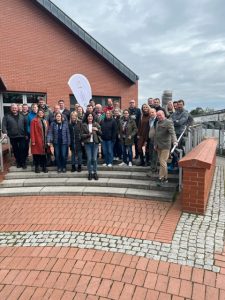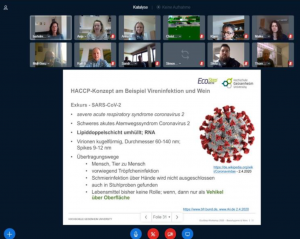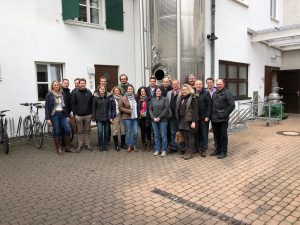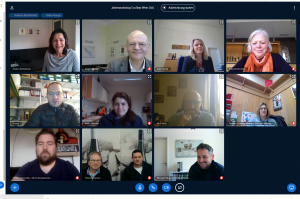On March 29, 2023, representatives of German wineries already certified with the sustainable management system "EcoStep-Wein" met for the 27th time for their annual workshop and exchange of experiences at the University of Geisenheim. Andrea Bartelmeß and Jürgen Kramer from the Katalyse Institute presented the EcoStep-Wein+ module, an extension of the existing management system "EcoStep-Wein", which is already optimized for sustainability in viticulture. EcoStep-Wine+ moves even closer to the criteria of the German Sustainability Code. Newcomers to the management system will be able to demonstrate their sustainable operations through a sustainability label on the certificate.
In the further course, sales opportunities and, in this context, the recognition of sustainability systems were discussed.
Dr. Maximilian Freund from the University of Geisenheim addressed the topic ofcarbon footprint from a global perspective and from the point of view of a winery.
Another focus of the working group each year is food safety in wineries. Dr. Freund reported, among other things, on bag-in-box as an alternative to bottles and the requirements as well as corresponding adjustments in the existing HACCP concept that result from its use.
Participating companies:
Winery Schloss Vollrads
Hessian State Wineries Kloster- Eberbach
Winery Dr. Loosen
Episcopal Wineries Trier
Winery Juliusspital Würzburg
Winery Bürgerspital Würzburg
State Court Cellar Würzburg
Winery Schmitt Bergtheim
Winery Hallburg Castle
Sparkling wine manufactory Schloss Vaux
State Winery Weinsberg
Winery Bernhard Mehrlein
State Winery Meersburg
Wineries Geheimrat J. Wegeler
Princely Castell's Domain Office
Winery August Kesseler
Winery Fritz Allendorf
Winery Schumann-Nägler
Winery Lamb Young
SM sparkling wine factory
Winery Reichsrat von Kesselstatt
Sparkling wine cellar Höfer
Reichsrat von Buhl
Leading representatives of the wine and sparkling wine estates met again online on 17.3.2021 for their annual EcoStepWein workshop. Not only the format proved that the ever-growing working group is facing the current situation, but also the other topics were discussed in a future-oriented way.
The exchange of experiences among themselves showed that all the winegrowers present are very satisfied to fulfill all aspects of sustainability with the help of the structures created by EcoStep-Wein and that the operational processes are subject to regular and complete monitoring.
Dr. Maximilian Freund from Geisenheim University of Applied Sciences explained to the participants the hygienic aspects as well as the potential hazards and risks in the food sector with the specific references to the wine industry.
The winegrowers present felt confirmed in their working methods by this presentation. The example of the topic of pests in the cellar showed that the working group always faces recognizable risks and prepares for them in time.
All relevant energy and environmental topics were dealt with just as proactively. The fact that EcoStep wine was recognized as a sustainable management system by the state government of Rhineland-Palatinate was happily noted.
The conclusion was that EcoStep wine producers have so far come through the Corana crisis well, as the trade is also increasingly paying attention to EcoStep wine certified winemakers.
Participants:
- Dr. Maximilian Freund, Geisenheim University;
- Ralf Bengel, Schloss Vollrads Winery, Oestrich-Winkel;
- Anke Haupt, Hessische Staatsweingüter Kloster-Eberbach, Eltville;
- Thomas Loosen, Winery Dr. Loosen, Bernkastel;
- Peter Geil, Castell Domain;
- Christian Frieß, Castell Domain;
- Sandra Bettencourt, Episcopal Vineyards Trier;
- Christoph Jäger, Nicolas Frauer, Juliusspital Winery Würzburg;
- Karl Brandt, Bürgerspital Winery, Würzburg;
- Stefan Schäfer, Staatlicher Hofkeller, Würzburg;
- Anja Schmitt-Kraiß, Schmitt Winery, Bergtheim;
- Klaus Wagenbrenner, Winery Schloss Hallburg, Volkach;
- Maike Münster, Sektmanufaktur Schloss Vaux, Eltville;
- Simon Bachmann, Weinsberg State Winery;
- Erika Buntschuh, Mehrlein Winery, Oestrich Winkel;
- Stefan Zwerschke, Baron Knyphausen Winery, Erbach;
- Dr. Dietrich, Meersburg State Winery;
- Andrea Bartelmeß and Hans-Moll Benz, Katalyse-Düsseldorf.
As the Rhineland-Palatinate Ministry of Viticulture stated in a press release on 26.02.21, EcoStep-Wein is recognized as a certificate provider for the Support Framework Sustainability in Viticulture (FöNa Wein). Small and micro-enterprises can receive support of up to 3,000 euros if they undergo certification for operational sustainability with EcoStep-Wein.
Online for the first time: EcoStep wine working group informs
and advises itself virus safe!
Representatives of the wine and sparkling wine estates met on 7.4.2020 for their annual EcoStepWein workshop in a video conference.
Dr. Maximilian Freund enlightened the participants about the hygienic aspects as well as the potential hazards and risks associated with the Corona virus.
Wine is safe: both in the production process and as a food and product!
By complying with the particularly high requirements for the personal hygiene of employees and their personal protective equipment and conscientious documentation, the participating winegrowers consider themselves well positioned in the current situation.
EcoStep wine proved to be crisis-proof and helpful in this respect!
Due to the current ban on contact, the originally planned meeting at the University of Geisenheim was not possible. However, it turned out that the exchange of experiences via an online platform was also lively and purposeful.
Thus, document checks and company audits in preparation for certification by GutCert are also envisaged via this portal, as is certification as a remote certification, with the indication that this will not cause any gap for the companies to use the certificate.
Participants:
- Dr. Maximilian Freund, Geisenheim University
- Ralf Bengel, Winery Schloss Vollrads, Oestrich-Winkel
- Anke Haupt, Hessian State Wineries Kloster-Eberbach, Eltville
- Thomas Loosen, Winery Dr. Loosen, Bernkastel
- Sandra Bettencourt, Episcopal Vineyards Trier
- Christoph Jäger, Nicolas Frauer, Juliusspital Winery Würzburg
- Karl Brandt, Bürgerspital Winery, Würzburg
- Stefan Schäfer, Staatlicher Hofkeller, Würzburg
- Anja Schmitt-Kraiß, Schmitt Winery, Bergtheim
- Klaus Wagenbrenner, Winery Schloss Hallburg, Volkach
- Maike Münster, Sparkling Wine Manufactory Schloss Vaux, Eltville
- Simon Bachmann, Weinsberg State Winery
- Erika Buntschuh, Mehrlein Winery, Oestrich Winkel
- Stefan Zwerschke, Baron Knyphausen Winery, Erbach
- Johannes Brückner, Meersburg State Winery
- Andrea Bartelmeß and Hans-Moll Benz, Katalyse-Düsseldorf
- Andrea Bartelmeß, Catalysis Düsseldorf, EcoStepWine
Press release. Event on 26.03.2019 at the Geisenheim University of Applied Sciences
EcoStep wine also this year entirely in the
Sustainability sign

The circle of EcoStep wine growers, which has been active for over 15 years, decided to communicate the original sustainability goals more strongly. One of the focal points this year was the question of the extent to which the input and output balance sheet for energy and materials, which has been carried out in all wineries up to now, should be adapted and whether the Water Framework Directive will result in innovations that are not fulfilled by the checklists already in use. On both points, the conclusion reached together with the Geisenheim University of Applied Sciences was that the templates meet all the criteria both for the introduction of an energy audit and for the preparation of a Waterfootprint. Nevertheless, the working group intends to continue working on environmental issues and will hold an environmental workshop this summer. All EcoStep-Wine winemakers work with a special responsibility for the environment and have been regularly defining principles and goals for this for years. The work of the EcoStep winemaker is facilitated and demonstrable by strategic planning at all levels. Precisely because EcoStep winemakers have been working sustainably for over 15 years through the use of the management system, the implementation of new legal regulations does not pose a problem. Nevertheless, there were lively discussions and a constructive exchange on a common approach.

